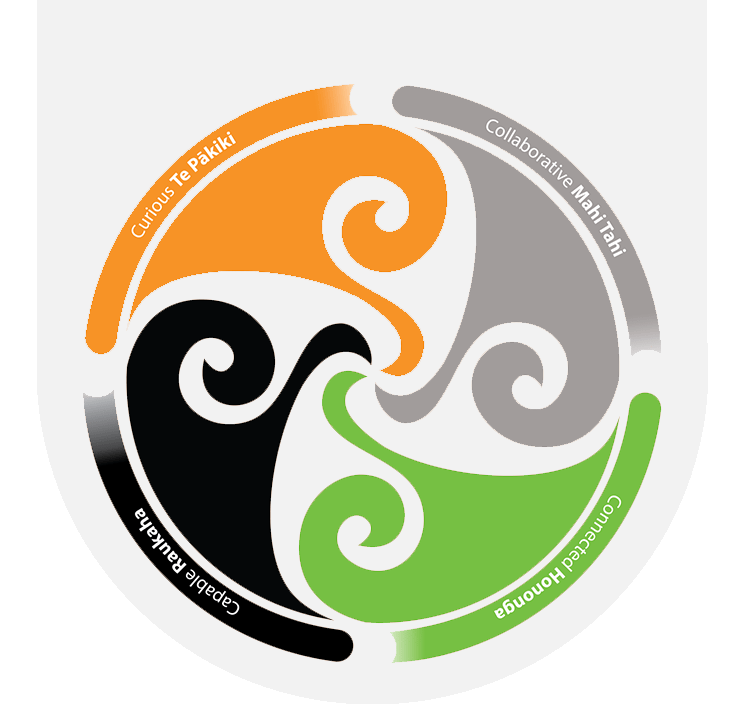Curriculum
4Cs
The Ormiston Primary School learning principles, the 4Cs, Curious, Collaborative, Connected, Capable, are part of the Ormiston Primary School Logo. The 4Cs help grow the capacity of our learners, “developing capabilities for living and lifelong learning” and support the vision, principles, values, and learning areas as identified in The New Zealand Curriculum.
Creating and Cultivating Curiosity
We value the innate curiosity that all learners have to make sense of the world they live in
We value learners being curious about Aotearoa and Te Aō Māori
We value being curious, taking risks, and sharing new learning
We value the exploration of knowledge as it gives curiosity staying power
We value all learners’ opportunities to explore their wonderings and curiosities, promoting their well-being through engagement
Thinking and Acting Collaboratively
We value collaboration that empowers learners to go beyond their potential.
We value connectivity with other learners (in and across habitats and other schools), educators, whanau, iwi, experts, knowledge, and digital technologies to foster lifelong learning.
We value collaborative opportunities for learners to learn from and with each other
We value collaborative opportunities that enable learners to engage in mutual learning experiences
We value a sense of community and shared responsibility for the well-being and educational journey of ākonga across the Ormiston Campus
We value all ākonga caring and supporting each other with their wellbeing
Constructing and Sustaining Connections
We value the connections our learners make within a diverse school community
We value equity and diversity within our community of learners
We value a curriculum that builds connections through and across all learning areas, now and in the future
We value the connections between learning and knowledge in different contexts for new purposes
We value meaningful relationships formed with learners (ākonga), educators (kaiako), families (whānau), and our local indigenous community (iwi), acknowledging their significance in fostering well-being and a sense of belonging
Shaping and Developing Learning Capabilities
We value capable learners in all areas of growth, excellence and aspiration
We value learners growing and learning in culturally sustaining environments
We value personalised success and the capabilities of our learners to grow
We value the different strengths and talents our learners bring with them
We value giving all learners an equal opportunity to shape and develop their capabilities and understanding of the world around them
We value learners who are empowered with capabilities while nurturing their well-being and self-awareness to support their learning
Home Learning
Our 4Cs Home Learning grid is posted on Hero by each Habitat and covers a two week time period. The shaded boxes in the Home Learning grid are compulsory, and learners are encouraged to choose any activity from the remaining boxes. Home Learning activities aim to encourage positive family interactions, as well as engage our learners with the Digital Subscritptions available to them.
OrmPS Home Learning Principles:
- Recognise the wide range of after school activities learners are involved in
- Encourages positive family interactions
- Allows relaxed time for children to pursue their own learning
- Recognise that children need life skills, as well as academic skills to cope with life beyond school and home
- Encourages caregivers and educators to work together for the benefit of all children.
Activities are designed to be completed within a period of time appropriate to your child’s year group;
- Year 1 and 2: up to 10 minutes a day
- Year 3 and 4: up to 20 minutes a day
- Year 5 and 6: up to 30 minutes a day
Learning Blocks
At Ormiston Primary, we have unique identities for the different parts of our school day.
iExplore
iExplore is based on learning through inquiry and is a time for learners to be curious. Inquiry-based learning helps develop metacognition (thinking about thinking). Children become aware of how they learn, develop skills in critical thinking, problem solving, self-regulation and reflection.
Learning Coaches provide authentic provocations for learners, which are available for them to engage with each morning. We see iExplore as ‘our reason to get out of bed in the morning’. iExplore is more self-directed in the senior habitats, and Learning Coach lead in the junior habitats. Skills developed during iExplore are carried over into the rest of the school day, both inside and outside the Habitats.
iDevelop
iDevelop involves targeted, personalised sessions with a Learning Coach to develop specific capabilities. iDevelop is dedicated time focusing on the achievement objectives of the New Zealand Curriculum in both Mathematics and Literacy. At Ormiston Primary, we utilise internationally recognised programmes such as The Better Start Literacy Approach to improve learner success.
iExperience
Nā tō rourou, nā taku rourou ka ora ai te iwi. With your food basket, and my food basket, the people will thrive.
This māori proverb encompasses the foundation of iExperience.
iExperience provides time for learners to collaborate and connect. Both compulsory and optional immersion sessions provide opportunities for learners to gain knowledge in a wide range of areas such as; Sport and PE, Culture, Drama, Art, Science, Digital Technology, and Interpersonal/Social skills. iExperience is about providing and participating in new experiences, as well as developing skills for successful self-directed and problem-based learning.
iBreak
Over the school day there are two 40 minute breaks. The first break is after iExplore and the second is after iDevelop. iEat forms the first 10 minutes of each break, giving learners the time to eat and drink before moving outside to WeInteract for 30 minutes. WeInteract provides the opportunity for free play outside, as well as the option to engage in organized sports/clubs. We also foster the creation of learner-led activities during iBreaks. If the weather is not suitable for outside activities, learners remain in their habitats with options such as board games and other quiet activities.


